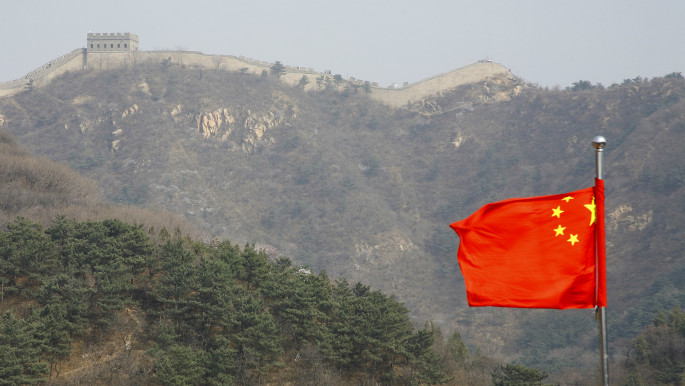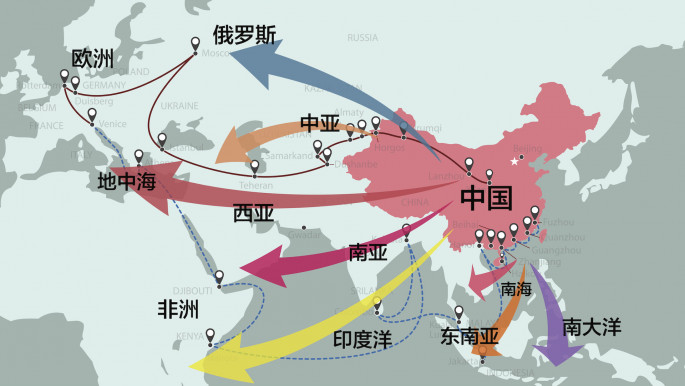Closer ties with Iran create risks for China's Middle East policy
Ever since Washington walked out of the Joint Comprehensive Plan of Action (JCPOA) nuclear deal with Iran, it has faced severe economic crises due to crippling US sanctions in two phases.
Prevented from carrying on oil-trade, another major setback for Iran is being cut off from the Western banking system SWIFT while even trade and business partners are being threatened with sanctions.
As a result, Iran has been looking towards the East again, depending on China as per its long-term objective. Consequently, China and Iran have gone ahead and upgraded their relations to the level of a comprehensive strategic partnership.
Meeting on the sidelines of the recent Shanghai Co-operation Summit (SCO) held in Bishkek, considerable bonhomie was seen between China's President Xi and his Iranian counterpart Hassan Rouhani.
Considering that bilateral terms with China are on an upward trajectory, it would be expected that Iran would automatically be accepted as part of the SCO forum which is mainly under Beijing's influence.
Though it has been an observer in the group since 2005, Tehran's membership remains pending and it is not a full member.
 |
|
| Read also: How China is heavily contributing to Middle East drone and missile proliferation |
Consisting of eight full members; China, Russia, Kazakhstan, Uzbekistan, Tajikistan, the Kyrgz Republic, India and Pakistan, the SCO has four observers, namely Afghanistan, Belarus, Iran and Mongolia. Additionally, six countries are titled 'dialogue partners', and these happen to be Armenia, Azerbaijan, Cambodia, Nepal, Sri Lanka and Turkey.
Representing three-fifths of Eurasia and half the global population, all the SCO members except India, are part of China's massive infrastructure and trade connectivity project, the Belt and Road Initiative (BRI).
Due to its strategic location, Iran is indispensable as an important node in the BRI, but even this factor has not helped it attain the SCO membership which could enhance and strengthen its political standing in front of the Western world – especially at this point when frictions with the US are getting worse, being part of a strong Eurasian alliance could have helped Iran gain clout.
However, it does not seem likely that Iran will become an SCO member anytime soon as certain hurdles remain in its way.
Firstly, any pronounced tilt towards Iran could potentially endanger China's strategic position in the Middle East.
 |
Any pronounced tilt towards Iran could potentially endanger China's strategic position in the Middle East |  |
Beijing may have pledged its support to Tehran, but it cannot take chances where its major trading partner Saudi Arabia is concerned.
 |
|
| Read also: Belt and Road Initiative: As America's power fades, China lures Arabs into its sphere |
Having bilateral trade worth $65 billion with Riyadh alone, China gives a lot of importance to its relations with the GCC and the stakes are high. As one of the fastest growing global economies today, China needs a reliable supply of hydrocarbons for keeping its growth rate stable.
Prioritising energy security, China has made massive investments in infrastructure and construction projects in the Middle East to cut down risks due to erratic political frictions.
Mainly focusing on the Gulf Cooperation Council (GCC) states, Beijing has become an important stakeholder and it is the largest investor and major trade partner in the Gulf. At the same time, relations were also elevated to strategic levels with major Arab states like Saudi Arabia and UAE.
Though Iran is also an important energy supplier in the same region, the problem is that it does not get along with Riyadh, and since long, both countries have been engaged in a struggle for regional dominance.
 |
Having bilateral trade worth $65 billion with Riyadh alone, China gives a lot of importance to its relations with the GCC and the stakes are high |  |
Representing the Shia and Sunni sects respectively, the divisions between both these Middle Eastern countries are only getting worse with time. For China, balancing both the sides is also crucial for the success of Beijing's Belt and Road Initiative so it is bound to mediate.
 |
|
| Read also: Trump ends waivers and inches closer to war with Iran |
Secondly, since the SCO is based on the ethos of the 'Shanghai Spirit', the group symbolises a unity of purpose. All members are equal in stature and decisions are taken with consensus, any bitter rivalries between members could impact the organisation's focus and global importance.
Having already accepted the two wrangling South Asian neighbours, India and Pakistan, the SCO already took a huge risk.
It was not an easy decision for the founding members and efforts are underway to promote interaction between both the countries under the SCO umbrella.
Giving Iran membership carries similar complications with Saudi Arabia and too many differences within members would turn the new organisation into a 'non-starter'.
Iran's inclusion would leave no reason for the forum to refuse Saudi Arabia or the UAE or Turkey. According to an expert, Nandan Unnikrishnan from the Observer Research Foundation in Mumbai, "Politics in the Middle East as a whole will play a role. There is still a confrontation between the Saudis and Iran, Saudi Arabia has quite a strong influence in some countries of Central Asia."
Another problem is that if Iran gets into the SCO, it could block the entry of the Gulf states as decisions are taken with consensus.
 |
If Iran gets into the SCO, it could block the entry of the Gulf states as decisions are taken with consensus |  |
Lastly, when Iran applied in 2008, it was already under United Nations sanctions and it could not be admitted to the forum until these were lifted as per SCO rules.
Finally, these sanctions were removed in 2016 as the nuclear deal had been clinched and for a while it did seem like Iran would be formalised as a member.
Unfortunately, the Joint Comprehensive Plan of Action (JCPOA) nuclear deal did not last long and the US scrapped it in order to negotiate for more stringent terms. At this year's SCO Summit, US sanctions also stood in the way of Iran's membership bid as the organisation would not like to start a new controversy.
Not only that, both China and the SCO forum are also committed to preserving the JCPOA.
If terms improve between Iran and Saudi Arabia and US sanctions are lifted and the nuclear deal continues, Tehran would finally become a member. Most likely it would be soon followed by Saudi Arabia, UAE and maybe even Turkey, the entry of these states into the SCO would further enhance the forum's value and expand its economic reach.
But right now, faced with tough choices, China has been diplomatically delaying Iran's inclusion in the SCO as it waits for a more suitable time.
Sabena Siddiqui is a foreign affairs journalist, lawyer and geopolitical analyst specialising in modern China, the Belt and Road Initiative, Middle East and South Asia.
Follow her on Twitter: @sabena_siddiqi





 Follow the Middle East's top stories in English at The New Arab on Google News
Follow the Middle East's top stories in English at The New Arab on Google News


